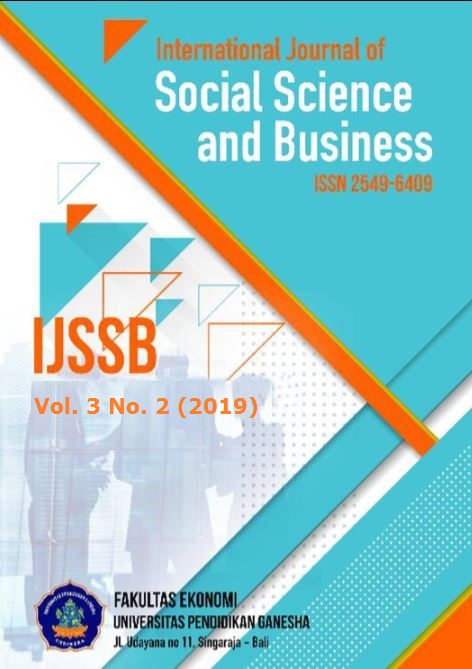The Effectiveness of the Implementation of Cash Flow System Model to Enhance the Ability to Write Cash Flow Reports
DOI:
https://doi.org/10.23887/ijssb.v3i2.18398Keywords:
Cash Flow System Model, Implementation, EffectivenessAbstract
This study aimed at finding out the effectiveness of the cash flow system model that has been validated from experts in a focus group discussion (FGD). This study used the continuation off the stages in the development method of the previous study, that is, the implementation stage. At this implement stage the cash flow system teaching model was tested in a class of students who programed financial accounting course, one of whose learning achievements was the ability to write cash flow reports. Data collection techniques carried out by means of observation, interview, documentation, and a learning achievement test. The study used the quantitative descriptive analysis technique by measuring the students’ learning achievement as seen from the scores they obtained in the teaching process of cash flow report writing sessions. This study was done based on the scores obtained in the process of the writing of cash flow reports. The assessment was done based on the scores obtained for the assessment process of attitude, participation, assignment and learning achievement as seen from the evaluation of the products produced. From the implementation it was found out that the students’ learning achievement in writing cash flow reports in terms of attitude, participation, and product evaluation respectively fell into a very good category. Hence, the cash flow system model is effective for use in the teaching process
References
Alihamdan. (2017). Implementasi. Retrieved from www.digilib.unila.ac.id/4718/11/BAB II.pdf
Dan, K., & Kota, P. (2017). Efektivitas Organisasi Dalam Penyelenggaraan Pellayanan Tanda Daftar Usaha Pariwisata (Tdup) Dinas Kebudayaan Dan Pariwisata Kota Semarang. Https://Media.Neliti.Com/Media/Publications/183710-ID-Efektivitas-Organisasi-Dalam-Penyelengga.Pdf, 6(2).
Hamruni, H. (2015). Konsep Dasar Dan Implementasi Pembelajaran Kontekstual. Jurnal Pendidikan Agama Islam, (Vol 12, No 2 (2015): Jurnal Pendidikan Agama Islam Vol. 12 No. 2 Desember 2015), 177–187. Retrieved from http://ejournal.uin-suka.ac.id/index.php/jpai/article/view/862
Ikatan Akuntan Indonesia. (2009). Standar Akuntansi Keuangan ETAP.
ISI Padang Panjang. (n.d.). Pelaksanaan Akademik.
Putro, A. A. (2015). JKAP (Jurnal Kebijakan dan Administrasi Publik). JKAP (Jurnal Kebijakan Dan Administrasi Publik), 4(2), 1–16. Retrieved from https://journal.ugm.ac.id/jkap/article/view/8453/6529
Sulindawati, Ni Luh Gede Erni and Metriana, M. A. (2018). Laporan Arus Kas Proses Penyusunan Dan Pelaporan Pada Berbagai Entitas Ekonomi.
Sulindawati, N. L. G. E. (2017). An Analysis of Instructional Material Need For Improving Students ’ Ability in Writing Cash Flow Reports, 134(Icirad), 146–152.
Sulindawati, N. L. G. E., & Meitriana, A. . (2019). An Analysis of the Reliability of a Teaching Model for Presenting a Computer-based Cash Flow Report. KnE Social Sciences, 3(11), 103. https://doi.org/10.18502/kss.v3i11.4002
Undikhsa. (2017). Pedoman Studi Program Sarjana dan Diploma Universitas Pendidikan Ganesha.
Undiksha. (2016). Pedoman Studi Fakultas Ekonomi-Undiksha.











